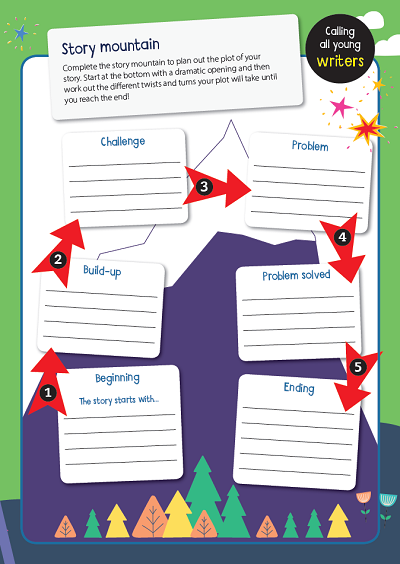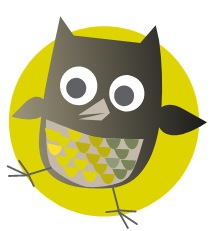Great stories have page-turning plots that keep readers glued to their seats to find out what happens next. These activities will help your child turn their brilliant ideas into a fantastic story with a beginning, middle, and end, and maybe a twist or two along the way as well. Make sure your child submits their finished story to this year’s BBC 500 Words short story competition!
Please note: The closing date for BBC 500 Words 2020 is Thursday 27th February. Find out more on our BBC 500 Words page.
1. Starting your story
Get your aspiring author to think about the event that will kick-start the plot of their story. Throwing the reader into the middle of the action straight away is a great way to grab their attention. You could ask your child to pick the opening scene from a favourite book or film and give it a twist to create a new plot and storyboard their own story. For example, what if Bilbo Baggins hadn’t met Gandalf at the beginning of The Hobbit, but Smaug the Dragon instead?
Author Top Tip:
Stories that jump straight into the action can be so exciting and intriguing. Have a go at beginning your story with a main character trying to survive a dangerous situation, or have a character do something really unusual.
2. Climbing the story mountain
Creating a plot is a bit like climbing a mountain – each event in the story builds on the one before it until you reach the peak, and then you descend again to reach the ending. Make sure your child’s story has a strong structure by making them complete a story mountain. Have your child draw a mountain with the subheadings ‘beginning’, ‘build-up’, ‘challenge’, and ‘problem’ on the way up, and ‘problem solved’ and ‘ending’ on the way down, or they could use the activity sheet below. Encourage them to think about the problems and challenges their protagonists will face.
Story mountain
Download this BBC 500 Words activity sheet and encourage your child to fill in the story mountain to plan out the plot of their story. Start at the bottom with a dramatic opening and then work out the different twists and turns the plot will take until you reach the end!
3. Overcoming obstacles
Action drives the plot of a story forward. Pick a fictional character and give them a story starter such as Spiderman discovering a radioactive banana in his lunchbox. Ask your child how the character would deal with the problem. Once they’ve explained their solution, add another obstacle. Try to keep up the game as long as you can (and see how outlandish the action becomes!). You could also try the game the other way around, with your child providing inventive obstacles and you suggesting solutions.
Author Top Tip:
A story isn’t just a sequence of events – it’s how characters make things happen and react to the things that happen to them that turns a plot into a story.
4. Crafting the perfect ending
The last lines of a story should pack a punch. List different story genres and discuss the different emotions each might evoke. For example, a reader of a horror story might feel nervous or uneasy if the story ends on a spooky scene. Ask your child what emotions they want a reader to feel at the end of their story and challenge them to craft a final line that creates that feeling.
Once you’ve been through these activities, there will be nothing stopping your child from creating a story complete with a beguiling beginning, a mesmerizing middle, and an enthralling ending!
More from Oxford Owl
- Blog: 4 tips to inspire children’s creative writing
- Blog: 4 fun ways to develop characters for a short story
- Blog: How to find the perfect words for your story
- Blog: All you need to know about the BBC 500 Words short story competition
- Tips and activities: On our How to Write Your Best Story Ever! page, children’s author Christopher Edge shares his top 10 tips to get your child writing, whilst free activity sheets will help them discover their inner author.
- Blog: Find more inspiration in this breakdown of the 2017 500 Words competition, including excerpts from last year’s stories.
Books to support creative writing
How to Write Your Best Story Ever!
Christopher Edge | Age 9+
Ideal for children wanting to enter story writing competitions! This is a humorous and authoritative book that will awaken the author in every child, unlocking their story ideas and giving them hints and tips to create their own stories.
How To Be A Young #Writer
Christopher Edge
This book will help children learn to craft brilliant stories, create believable characters, write powerful endings and much more. Packed with practical tips and insider advice from published authors, this guide opens up the secrets of how to write well and guides young writers all the way through from beating the fear of the blank page and learning to edit their work, to how to get other people reading their stories.
Write Your Best Story Ever! Notebook
Christopher Edge | Age 7+
A must-have notebook to unlock the imagination and inspire children to start writing, full of great hints and tips, and activity pages for jotting down words, sketching characters, and writing in stories.





